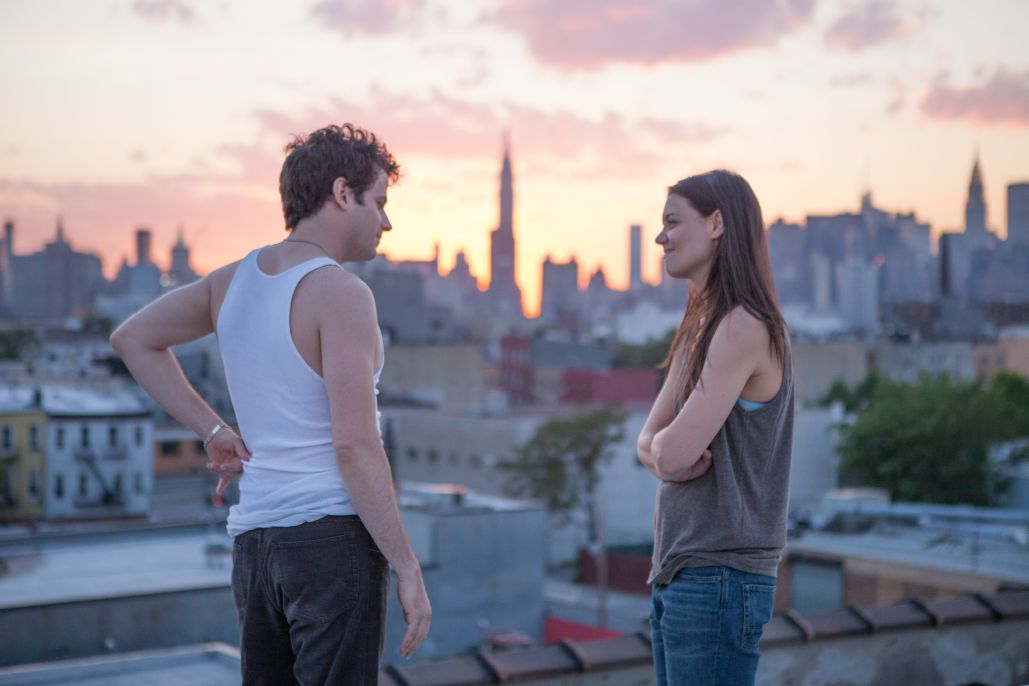By Chlotrudis Independent Film Society
Rating: 3.5 cats

Year: 2016
Jason says: “As a film, TOUCHED WITH FIRE sometimes struggles with being bipolar in one of the ways that its characters do, seemingly wanting to claim it as a source of creativity even if the connection is shaky, while the story being told is much more focused on the destructive side of the situation. I can’t exactly blame filmmaker Paul Dalio for that; his film is based in part on his own life story and that’s one way to handle a difficult relationship with oneself. Or, perhaps, he’s got that right but there’s something a bit off about the rest of the story, and that’s why a lot of good pieces don’t quite assemble into a great movie.
“The best piece in it is probably Katie Holmes; she’s there to play Carla, a poet of some repute whose bipolar disorder manifested in college but has been mostly under control until recently. While the film often emphasizes the manic side of her condition almost to the exclusion of the other side of the cycle, Holmes always makes Carla seem like she wants to function better; there’s enough doubt in her agitation that the audience can feel something slipping away as she grows more manic, and uncertainty in the later scenes as Carla’s lover Marco puts some harsh quotation marks around ‘getting better’. Though superficially presenting a broad portrait of mental illness, Holmes manages to make Carla a character that a viewer can identify and empathize with.
“Luke Kirby is just a notch or two below her, and to a certain extent that’s the character he’s given: His Marco is also a bipolar poet, the type more likely to be found in rap battles than English departments, but less troubled by his condition, which means Kirby spends much of the movie pushing against people trying to hold him back (to his way of thinking) rather than himself, and that’s a simpler, less fascinating characterization. I suspect that he gets the behavior right, and he does vary the intensity fairly well, but even if that’s the case, a preformed being honest and true could still use a bit more to work with.
“The two of them meet when committed to the same mental institution, and in some ways that’s where Dalio and his cast do some of their best work, showing the pair not just falling in love but synching up and creating a sort of feedback loop. It’s exhilarating but also clearly dangerous, a mix of finding a soul mate and being tempted from the righteous path that scrambles the situation enough to let the audience feel a little bit of the characters’ mania. It’s here that Dalio seems to make some of his more subtle commentary, as there’s no avoiding how infantilizing the environment seems, with furniture out of elementary schools, Carla kneading Play-Doh when she talks with Marco during her sleepless nights, and the patient but authoritative doctors in the ward
(notably different than the heroically giving, though worried, parents played by Christine Lahti and Griffin Dunne).
“I almost wonder if those parts work so well because that’s where Dalio is showing familiar background rather than trying to craft a story, where things seem a bit bumpier. As much as he is often very strong in terms of getting into a character’s head, showing the passage of time and not necessarily belaboring points he’s eager to explain (though that’s not always the case, as he has noted author Kay Jamison show up and explain responsible medication at one point), he trips up in others. That there should probably be more of a cyclical structure when chapters are named for seasons is one thing, but toward the end, he loses track of the balance between his characters. A major decision on Carla’s part is presented via an angry March’s reaction, and when the film circles back to its initial flash-forward (better than most do, it should be noted), one of the leads has had a lot of important material
skipped over in the apparent service of a happy ending.
“Given that the film is at least partially a roman-a-clef, it’s understandable; there may just have been no way to stay fairly close to
the real timeline. His personal connection to the material and some excellent work by the cast give it a strong foundation, but don’t quite get it to become the great film it should be. 3.5 cats
“Seen 20 February 2016 in AMC Boston Common #15 (first-run, DCP).”
